|
On September 12th, the Church celebrates the feast of the Most Holy Name of Mary. Throughout the year we honor countless saints who have uniquely modeled for us the path to holiness. However, Jesus and Mary are the only two people for whom the Church sets aside a feast just for their name. Each person’s name deeply and intimately reveals something about who they are. If this is true for myself, you, and each of the saints, it is all the more true for Jesus and His Blessed Mother.
Throughout the centuries, Mary has earned countless and various titles based on the places she has appeared and the different characteristics that define her. But before all of these, she was given her first title by the child Jesus: Mom. This wasn’t a title Mary could have given herself; rather it was bestowed on her. The Father chose Mary to conceive and bear Jesus, and it was in His birth that she became a mother. It was through the Incarnate Lord that Mary’s motherhood was fulfilled and she became “Mom.” For all of the times you have called your own mother’s name, Jesus called Mary “mother,” too. He spoke her name in joy and in sorrow, in petition and in gratitude. He models for us how to live in relationship with His own blessed mother and how to speak her name. However, even with Jesus showing us the way to His mother, it can still be a challenge to have a relationship with Mary. How do we relate to her and live under her maternity? How do we speak to Mary, our spiritual mother? The Church models so many beautiful devotions in answer to this question. We can pray a morning offering through the Immaculate Heart of Mary, asking her to be with us throughout our day. We can pray the rosary, walking alongside her through Jesus’ life. We can sing a Marian hymn with our nightly prayers, inviting her to watch over us in our rest. When we speak Mary’s name and call out to her as our spiritual mom, we are fulfilling St. Francis de Sales' words to “run to Mary, and, as her little children, cast ourselves into her arms with a perfect confidence.” We can give ourselves to Mary, like Jesus did, and she will in turn bring us closer to God. In the repetition of these Marian prayers and hymns we spiritually speak our mother Mary’s name and ask for her help from the depths of our hearts. Just like our earthly mothers cherish the little gifts we give and imperfect efforts we make, Mary graciously receives and multiplies everything we call out to her from our heart. Mary doesn’t need us to come to her with perfect devotion, but with an honest desire to grow closer to Jesus through her. Day after day, we can speak her most holy name and call on her assistance with the confidence that she will come to our aid. As we honor the Most Holy Name of Mary, we pray the Lord will enkindle in us a deeper trust and devotion to His mother. Let us speak Mary’s name with love and devotion, trusting in the power of her intercession and mediation for us. Mama Mary, pray for us! **This image is from: https://commons.wikimedia.org/wiki/File:William-Adolphe_Bouguereau_The_Virgin_With_Angels.jpg***
0 Comments
Tomorrow’s Feast of the Visitation of the Blessed Virgin Mary to her cousin Elizabeth celebrates an encounter between two unlikely mothers. What richness can be found in contemplating the embrace and companionship between these two women!
Luke 1:39 recounts how immediately after learning that she was with child, Mary traveled to the home of her cousin Elizabeth, who, despite her old age, was also pregnant. Learning about a pregnancy can bring with it a flood of far-ranging emotions, questions, and concerns that can leave one reeling; it’s not hard to justify a response of turning inward. Yet Mary set out in haste to be at the side of her kinswoman. In undertaking a difficult journey to be with another, our Blessed Mother highlights the importance of supporting and accompanying women, especially those who may be experiencing challenging or difficult circumstances. Indeed, when considering the two women in this Gospel passage, we can recognize an unexpected pregnancy, years of enduring the pain of infertility, and a great deal of uncertainty. Countless women today face these same struggles, often alone and in fear, with no idea of where to turn for support. It is our duty to offer these—and all women—the companionship Mary and Elizabeth shared. Motherhood (and the journey towards motherhood) presents physical, mental, emotional, spiritual, practical, and financial difficulties like no other. It carries with it utter bliss, heart-rending sorrow, and everything in between—none of which should be carried alone. In the Visitation, we see a model of how we are called to enter into the realities women face and offer support and accompaniment, especially to mothers who are most in need. As the USCCB’s Respect Life Prayer & Action monthly prayer guide for May put it: “In addition to ‘walking with’ mothers in love, support, and friendship, we can also help answer their needs for practical and material assistance. Inspired by our Blessed Mother, we can help connect mothers with the Church’s extensive network of social services to ensure mothers and their children obtain all the necessities of life. Through generous stewardship of the gifts God has entrusted to us of prayer, time, talent, and treasure, we can help meet the needs of mothers as they welcome and care for God’s precious gift of life.” I invite you to celebrate this feast day by imitating the example of Mary and taking the initiative to reach out to a woman in your community. While this may involve going a bit outside our comfort zone, each of us, no matter where we are in life, can offer this much-needed kinship. We don’t have to be in the same boat as a woman in need or know her pain or experience firsthand. We are simply called to walk alongside her, providing support, friendship, and encouragement. Accompaniment does not mean taking on or attempting to fix someone’s problems. It means a willingness to listen, to be truly present to another, to offer reassurance, closeness, and compassion. Reaching out to a woman in your community can take many forms, from working to enact systemic change (such as advocating for paid parental leave or working to ensure access to healthcare) to just grabbing a cup of coffee with a mom you know. Other concrete ideas for living out the spirit of the Visitation include offering to babysit, donating to or volunteering with a local pregnancy center, starting or joining a mom’s group at your parish, organizing a diaper drive, or making a meal for a family. You may consider getting involved with Walking with Moms in Need, the Church’s nationwide initiative that helps Catholics form parish teams to identify resources in their local area and connect pregnant and parenting mothers with support and services. For a woman struggling in her fertility journey, just lending an ear, offering to accompany her to a doctor’s appointment, or putting her in touch with someone else who has been there can make a huge difference. In every gesture of closeness, we will find ourselves enriched and accompanied in return. May we strive to emulate authentically the spirit of the Visitation, so that every woman can come to feel the profound embrace of kinship! **Image: https://artmuseum.princeton.edu/collections/objects/34052**
“Mothers are the strongest antidote to the spread of self-centered individualism… It is they who testify to the beauty of life.”
I sit on the second leg of a cross-country plane ride sandwiched between a carseat and a five- year-old boy. My son sleeps deeply with his head on my lap, scrunched up in his seat. In my arms is my six-month-old daughter, whom I attempt to nurse over her brother. I sit in this makeshift human game of tetris, breathe in deeply, and think, hours left in our journey, “what is my life?” There are many times when I have asked this question throughout the past five and a half years. It’s a question I ask bemusedly from time to time when I have been stretched in such a way that I never thought would be possible—in the moments when I am asked to give creatively, humorously, or abundantly. As you might imagine, motherhood presents those opportunities quite often. I smirk in these moments because I know these thoughts come from the woman who said as an adolescent that she would rather not have children. Babies were foreign to me and teenagers seemed like purgatory. Why would I want to have kids who would one day likely treat me the way I had treated my parents as a young person—always keeping them on their toes, suggesting another mission trip or school program that happened to be thousands of miles away in third world countries, or simply giving them attitude, ungrateful responses, and callous words? Why would I want to pour myself out to a being that may not appreciate me or reciprocate the love I gave? Why would I want children? My family loves to tease me about and remind me of this fact with each child I have. Here I find myself, three kids in, packing extra clothes for that one blowout, using a toddler potty in dire instances of emergency, cutting sandwiches into bento lunch boxes, sneaking vegetables into homecooked dinners, and bandaging the latest knee scrape. Here I find myself, convincing toddlers that shoes are a good idea, cleaning the mold from bath toy crevices, trying to keep my cool when the freshly assembled yogurt and granola bowl is tipped over, listening to children’s saint podcast episodes, and reading all the books using all the voices. How did this happen? The best answer I can say is grace. God took the young callous woman who had never changed a diaper and made a mother out of me (more on that journey another time), and I found that I loved it. I remember when our first son was born. I would go to bed after he was asleep and lay there hoping to be needed by him again (I know—crazy right?). I relished the fact that I could provide for him—I could feed, soothe, hold him. It felt like the most important task I had ever been given. Probably because it was and continues to be. As John Paul II wrote in his Letter to Women, “For in giving themselves to others each day women fulfil their deepest vocation.” Today, motherhood takes every ounce of my energy and creativity and patience. There have been many times when I have fallen short of my vocation to love unconditionally, forgive immeasurably, and respond charitably. I lose my patience, raise my voice, and threaten ridiculous consequences. Sometimes I wonder who indeed the child is in a scenario. But I don’t regret a minute of it. My task, though often behind the scenes, is to help form a civilization of love starting with my domestic church—my home. My task, though often overlooked, is to raise men and women of virtue striving to become saints. My task, though often ignored, is to bring the "genius of women” to society--“placing [myself] at the service of others in..everyday [life].” I have learned slowly what St. Ignatius of Loyola spoke of when he prayed to “give and not count the cost.” As a teenager, I could not fathom the depths of true love and mercy. Years later in graduate school, I heard a professor define mercy as “love that keeps giving in the face of rejection.” What seemed like it was for chumps to my teenage mind now comprises my entire life mission. Mothers, and parents overall, are called to live this mercy profoundly—imaging for the world in a special way the love of God. And I’m not the only one attempting this kind of supernatural love. I’m surrounded by these kinds of mothers. I’m surrounded by women who give of themselves extraordinarily every day. Mothers who offer to watch my kids for a couple of hours to give me a mental health morning. Mothers who drop off a day of meals when our family is sick. Mothers who leave notes of encouragement for one another. Who call to say hi and just check in. Mothers who remember my birthday. Who encourage me with their witness of authenticity, humility, and courage. Mothers with multiple roles or jobs ,new mothers and seasoned mothers. So many times, I have looked around and thought not only, “what is my life?” but “what is life, what is society, what is culture, without motherhood?” And not only physical motherhood, but spiritual motherhood, too. Women who bring life into the world in ways as unique as themselves—with their compassion, sensitivity, creativity, and love. I have been humbled by this vocation time and again. And so, I look up with a smirk to the Lord, my shoulders wrapped in a nursing cover, finagling an infant and sweating, trying to keep two children asleep in a cramped airplane row, and say not only, “what is my life?” but “thank you for this life. I have always cringed when I have heard people describe new and seasoned mothers as “cute” or “adorable.” Though those things might be true, and though I might be biased as someone who is not a mother, I have always seen motherhood in a different light. “Cute” and “adorable” do not capture the fearsome and challenging vocation of being a mother. To me, motherhood seems tenacious, fierce, and strong. My perspective of motherhood has been shaped by my own mother. My mom, a Danish and Irish Catholic originally from Long Island, is the sweetest and loveliest person you will meet. She has a discerning eye for the most appropriate greeting card for any occasion. She generously picks out treats from my favorite bakery and thoughtfully compiles care packages to extend her love from across the miles. Sparing no opportunity to offer encouragement, a listening ear, and hope, my mom’s gentleness and kindness continue to leave a lasting impact on my life. At the same time, my mother is fierce. When my sister or I have experienced painful moments in our lives, my mom has sat with us, shared our anger or sadness, but also encouraged us to get up, have courage, and continue on. I watched her care for my grandmother with tenderness during my grandmother’s last years of life. Despite the many emotions that came with caring for an aging parent, my mother never relented in her patience or warmth though my grandmother was often scared or unsteady on her feet. I think often of how I learned to be strong and accompany others because of watching how my mom carried herself and listened patiently to others. I think the virtue that my mom has cultivated within me the most is hope, as she often reminded my sister and me that, though we might find ourselves sad or in pain in challenging moments, “the birds will still sing, and the sun will come up tomorrow.” There are many moments when my mom’s strength, protectiveness, and ferocity have come to the fore. However, there is one story in particular that I believe encapsulates my mother’s strength. When I was 8 or 9, my family vacationed at a beach in the South Carolina low-country. I loved to play in the ocean and would often lose myself jumping and swimming in the salty waves. One day, when I was swimming in the ocean and immersed fully under the water, I felt a hand grab my wrist and pull me out of the water. It was my mother. From where she was standing on the shore, she had run into the water to drag me back onto the beach because she had seen a large shark fin making its way on the surface of the water towards where I was swimming. In the Book of Wisdom, Chapter 7, there are beautiful verses describing Wisdom, often personified in the Hebrew scriptures as a woman. One verse in particular has always been my favorite and reminds me of the strength and ferocity of women in my life, especially my mother: “For she is the breath of the might of God” (Wisdom 7:25). When I think of this verse, I consider the unfathomable strength and ferocity of God. From our Scriptures, we know that the might of God has destroyed armies (2 Kings 19:35-37), parted the Red Sea (Exodus 14), created the world (Genesis 1-2), healed the sick (Matthew 14:14), and brought the dead back to life (John 20). At the same time, the word “breath” evokes a gentle sensation of air that is cooling, reviving, and life-giving. A breath is a small share in an organism’s larger pattern of breathing and is just one small part of the total function of a living being. From my view, it seems to me that my mother, as well as all mothers, have the capability to be “a breath of the might of God.” Mothers have the power to give life, protect, defend, encourage, and strengthen. They share in the power of God’s might through their steadfastness, gentleness, fierceness, and love. Mothers, because they share in God’s might, invite us to contemplate God’s own fierceness, love, tenacity, and tenderness. Much like my mom letting nothing stop her from pulling me out of the water to protect me from a shark, God also is relentless in wanting to be in relationship with us as God’s beloved children. Like my mother cared for my grandmother with patience and tenderness, God also gifts us merciful, gentle love no matter the state we are in. Just as my mom continues to listen, encourage, and instill hope, God also accepts us and loves us just as we are. Though God’s power and might is totally incomprehensible to us as human beings, we may know it in a small way through the gift of our mothers.
On October 22nd, we celebrate the feast of St. John Paul II, a saint of our times! He is remembered for many things, including his passion for the arts, outdoors, youth, and families. St. John Paul II also had a deep devotion to Mary, and in what I know of St. John Paul II’s life and loves, we can bring no greater joy in celebrating his sainthood than by honoring our blessed Mother.
St. John Paul II’s favorite prayer was the Rosary, and I too, have developed a fondness for praying it. I stumbled upon a recording a couple of years ago in my desire to pray it intentionally. As I would listen and pray along in my car every morning before work, I discovered a love for each mystery and the fruit they bear, as like Mary, I “pondered them in [my] heart” (Luke 2:19, 51). The mysteries of the Rosary invite us to contemplate the life of Christ through the memories of Mary. St. John Paul II says remembering these mysteries “were to be the ‘rosary’ which she recited uninterruptedly throughout her earthly life” (Rosarium Virginis Mariae, §11). In this remembering, the account of the Gospel from the eyes of Mary are timeless, “not only belong[ing] to ‘yesterday’; they are also a part of the ‘today’ of salvation” (John Paul II, Rosarium Virginis Mariae, §13). In this, St. John Paul II reminds us that the Rosary is an invitation to participate in Christ’s divine life, and it is relevant across time to the faithful of all ages. Recently my routine for praying the Rosary has changed as I am now on maternity leave and spend the day taking care of my newborn daughter. Instead of rushing to get my two-year-old son into the car and dropped off at daycare before work and enjoying my prayer time alone in the car, we have the opportunity to hop in the stroller and walk to daycare, spending time together saying hi to neighbors and marveling at the changing of seasons before he starts his school day. Despite the enjoyment both my son and I get from these walks, in the transition of summer at home with mommy to school, and the transition from being an only child to living the realities of being a big brother at only two years old, for quite a few weeks my son was not happy about leaving home for the day. Although my son loves school, he was hating drop off, and his anxiety (and let’s be honest, mine, too) crept in the closer we got to school each day. One morning as I was trying to get him excited for the day, I asked him if he wanted to pray the Rosary with me, telling him it always brings me calm and comfort, and he said yes. I told him I would let my recording play, and I would tell him the stories of each mystery. Thus began a new routine for us each morning. As the Joyful Mysteries play, I tell him about how much Mary loved God that she said yes to being Jesus’ Mommy, and how we pray that we can love God like her and say yes to Him when he needs us to. When the Luminous Mysteries play, I tell him about Jesus’ first miracle, turning water into wine at the Wedding at Cana, and that through Mary, she will lead us to Jesus and help us see the miracles he’s performing in our own lives. In praying the Sorrowful Mysteries, I am very closely brought to tears as I think about explaining death to a toddler, and moved by Jesus’ sacrifice for us, telling my son that no sin stops Christ’s love for us. We pray to be good people and follow the will of God. And when we pray the Glorious Mysteries, I get to teach my son about the glories of the Holy Spirit and Heaven, praying for our ultimate happiness with Jesus, Mary, and all the saints. In praying these, I am in awe of how parenting is transforming my heart, teaching me to be like a little child, loving Jesus without abandon like my son does. By the time we’ve prayed our Rosary for the day, we’ve arrived at daycare. Filled with his spunky confidence and newfound graces, my son hops out of his stroller and says “let me give you a kiss for the road,” and sends me off on my way. Each day, he runs off to the playground to play with his friends, and I am amazed by the graces we’ve both received by praying the Rosary together. In his great love for both the Rosary and the family, St. John Paul II called families to pray this prayer together, acknowledging how its graces unite the family: Individual family members, in turning their eyes towards Jesus, also regain the ability to look one another in the eye, to communicate, to show solidarity, to forgive one another and to see their covenant of love renewed in the Spirit of God. Many of the problems facing contemporary families, especially in economically developed societies, result from their increasing difficulty in communicating. Families seldom manage to come together, and the rare occasions when they do are often taken up with watching television. To return to the recitation of the family Rosary means filling daily life with very different images, images of the mystery of salvation: the image of the Redeemer, the image of his most Blessed Mother. The family that recites the Rosary together reproduces something of the atmosphere of the household of Nazareth: its members place Jesus at the centre, they share his joys and sorrows, they place their needs and their plans in his hands, they draw from him the hope and the strength to go on. (Rosarium Virginis Mariae, §41) From daycare drop-offs to contemplating our family’s deepest sorrows and joys, we too as a family have found this hope and strength of the Rosary to be true and timeless. As we prepare to celebrate the Feast of St. John Paul II, I invite you to honor him and our Blessed Mother by taking the time to pray the Rosary, finding twenty minutes of your time to devote to contemplating the face of Jesus. St. John Paul said, “a prayer so easy and yet so rich truly deserves to be rediscovered by the Christian community… I look to all of you, brothers and sisters of every state of life, to you, Christian families, to you, the sick and elderly, and to you, young people: confidently take up the Rosary once again. Rediscover the Rosary in the light of Scripture, in harmony with the Liturgy, and in the context of your daily lives” (Rosarium Virginis Mariae, §43). Know of my unending prayers for you as you begin this rediscovery of the Rosary for yourself, as with Mary, you too ponder these mysteries in your heart and recognize their fruits in your life. St. John Paul II, pray for us! Our Lady of the Rosary, pray for us! *This post was originally published on October 22, 2019.
I believe that I shall see the good things of the Lord in the land of the living. -Ps 27:13
The three of us sat around the dining table and cried—a toddler, a little boy, and a pregnant mom. A pitiful orchestra unleashed after a season of transition, a day of disobedience, and the moment that broke the camel’s back: a bowl of yogurt. The toddler had insisted on finishing the yogurt with his hands—which he was told would result in that being his final serving. He looked me in the eye and dipped his little hand in the bowl once more, using it as a makeshift spoon. The yogurt was taken. The wailing ensued. After what felt like 1,000 moments of defiance that day, after consecutive days of a 6-months-pregnant woman chasing small boys in the summer heat with little rest, and after racking my brains out to creatively navigate sibling rivalry, whining, and toddler grumpiness, I put my head on the table and started crying too. My 5-year-old joined in for moral support. After a few minutes of this little concert, I couldn’t help but laugh at the pitiful scene. What must it have looked like to the outside world? Two children and a grown woman competing for the loudest sobs. My husband came in a few minutes later from working in the yard and took over. “Go and rest,” he said. “I’ll take care of the boys.” I shuffled up the stairs, sniffling in defeat, for a few minutes to reset. And I knew I needed to see Him. I knew once again I needed to spend time with my Creator and regroup. Meditating on today’s Psalm from the daily readings reminds us of a beautiful truth: “I believe that I shall see the good things of the Lord in the land of the living.” Whether or not I felt it in this moment of exhaustion and despair, God’s goodness is always there. He stands ready to bestow on us His strength, His mercy, and His love in the here and now—even in the midst of suffering. The Lord never promised the removal of suffering from our lives (which any of us can note by listening to 30 seconds of the news cycle), but He did promise to sustain us and be with us “even to the end of time.” And it is for this reason that I can join the psalmist in choosing to see “the good things of the Lord” right here and now “in the land of the living.” This Psalm is particularly close to my heart because it has been turned into a lovely song by the ecumenical Taize community in the Burgundy region of France. The music of the Taize community was instrumental (no pun intended) in my reversion at the end of my college career and became an easy way for me to “pray without ceasing.” I have come to sing the song inspired by Psalm 27 for nearly a decade: “I am sure I shall see the goodness of the Lord in the land of the living,” the chant goes. “Yes, I shall see the goodness of the Lord. Hold firm, trust in the Lord.” There have been many days in this last trimester of pregnancy when I have had to cling to this belief and hold firm in trusting the Lord. My third pregnancy has brought with it the usual physical demands on the body, as well as the benefit of chasing two toddler boys around in the summer heat. Perhaps I can blame the extra dose of female hormones from my baby girl for the extra emotional complexity I’m experiencing. In my weekly women’s group in which we are reading “This Present Paradise: Spiritual Reflections from Elizabeth of the Trinity,” one of the questions for reflection was “do you ever feel small and insignificant?” I couldn’t help but laugh. “All the time!” I answered, especially now in a season in which I am grappling with my physical and emotional limitations. The independent woman who has always done things on her own, found a creative solution, and seen life in the glass half full perspective can barely walk to the playground, cook a meal, or lift a laundry basket. My easygoing nature has given way to my temper more times than I can count, and my patience is wearing thin. I’ve realized I can’t do anything during this time but cling to God. I am small. I am insignificant. But I am His. The Lord knit me in my mother’s womb, called me by name, and looked at me and proclaimed: “She is good.” The Lord worked throughout time and space to bring me into the fullness of redemption and sent His only begotten Son to die for me. And He continues to pour out His grace, mercy, and blessings on me through His Church, the sacraments, and my loving friends, family, and community. So yes, I am one of billions. I can only do so much. And though I may feel small and insignificant and overwhelmed these days, I can still see and experience the goodness of the Lord right here and now—in the land of the living. Hold firm. Trust in the Lord. For more resources on Marriage and Family, please click here. As someone who has always looked forward to the next challenge or opportunity both personally and professionally, I haven’t been very skilled at pausing and reflecting on the past. Writing this passage challenged me to settle myself enough to reflect on my journey as a Catholic father, and for that I am thankful as it contains many opportunities for me to continue to grow as both a Catholic and a father. My journey as a Catholic father is closely intertwined with my Catholic faith. My mother was a practicing Catholic and was always engaged in parish life. She also was a Catholic school teacher for many years. As a result, my sister and I were raised Catholic. In my case, this included attending Catholic school during my primary years and attending a Catholic university. I, like many other young Catholics, made my way to becoming an adult in the Catholic Church through Confirmation. While residing at home led by my mother, my sister and I were actively involved in our local parish. My first set of real-life religious decisions came when I went away to college at the University of Notre Dame. At this point, my religion did not feel like it was my own. It felt like it was my mother’s religion and my connection to it was not as clear. During my years at Notre Dame, a campus with over 150 venues in which to pray or attend Mass, somehow I managed to not regularly attend Mass. During my college years, I met my wife of now 32 years. She, like my mother, was an active Catholic who felt sure of her connection to her faith. During our early years of marriage, while she strongly modeled the Catholic faith with regular Mass attendance and engagement in parish life, I once again managed to get by with a part-time Catholic mentality while still searching for how Catholicism would be “my faith” rather than my mother’s or my spouse’s. But my wife and my mother were role models who kept me close to the Catholic Church during this period of uncertainty and questioning. After being married for just over 3 years, my wife and I conceived our first child. After she was born, we immediately began preparations for our daughter’s first step into the Catholic faith with the sacrament of Baptism. During this process, I had a real awakening: many of the questions I had been asking regarding my faith suddenly seemed selfish and self-serving. Although I felt I was prepared to be a father, I felt helpless in many ways to control the events that would impact my daughter throughout her life. It became clear to me that our daughter, and a few years later our son, would certainly need the love and support of their parents. However, they would also need something more—something that would sustain and anchor them throughout their lives regardless of the circumstance or challenge. This was faith, the Catholic faith. Not only would our children need this faith, but so would I. The blessing of fatherhood for me came with many gifts. My Catholic faith had become planted in some very good soil and, as a result of my fatherhood, began to grow. As our children grew up and became adults, my journeying with them as a father, husband, Catholic, and business leader has had its challenges. There was always an endless stream of competing day to day priorities. It was disappointing when, despite all our best efforts to keep all the balls in the air, inevitably some would drop. Reflecting back, it was being present at those moments that gave my fatherhood and faith deeper meaning—when our children wanted to reach out for support, advice, a kind ear, or just to talk about their journey through both life and faith. In some cases, my children might not see the connection between their life journey and their faith journey, as I certainly didn’t a number of years ago. This provides a great opportunity as a father to create these connections for my children as they become full participants in our society and ultimately leaders in their communities, parishes, and professional lives. Having grown in my faith throughout my vocation as a father, I hope that I can be for my children the same role model of a loving, thriving Catholic faith that my mother presented to me. I stumbled into entrepreneurship in 2016 after studying philosophy, theology, and anthropology for my undergraduate and graduate degrees. Ending up in the business world felt like a long and winding road filled with sleepless nights, much discernment, and many conversations. In the few years after graduating from college, like many early 20-year-olds, I felt untethered and unsure of my direction. What was my direction in life? What was my mission? How did the Lord want me to use my gifts and talents to serve him? At the time, I attempted to answer these questions by searching for women who had accomplished work in the same field that I was going into. I spent endless hours looking for women on LinkedIn in their 40s and 50s who had achieved a successful career while also being married and raising a family. My search was futile. Although I did find a couple of single Catholic female entrepreneurs to connect with, for years, I felt like I was “making it up as I went along”: trying to weld married and family life while scaling a business, hiring and firing employees, serving clients, and trying to keep God in the center of it all. Every vocation for women within the Church is beautiful and worthy, but being a Catholic entrepreneur in particular has been challenging. Although I have developed some great friendships with secular business women, I can’t connect with them fully about discerning business decisions with my spiritual director or praying a daily rosary for my employees. Within the Catholic sphere, I can’t completely relate to stay-at-home mothers or women who are working a 9-5. I desperately needed a mentor but could not find one who was willing to devote time and effort to my growth. Speaking to women’s particular vocation, Pope John Paul II in Mulieris Dignitatem spoke to every woman’s calling to love: “The moral and spiritual strength of a woman is joined to her awareness that God entrusts the human being to her in a special way. Of course, God entrusts every human being to each and every other human being. But this entrusting concerns women in a special way - precisely by reason of their femininity - and this in a particular way determines their vocation”. Here, Pope John Paul II illuminates women’s ability to “receive the other” because of the design of their femininity. Through their motherhood, spiritual and physical, women are capable of receiving, knowing, and loving others in a manner different to men. God entrusts humanity to women, knowing that she is uniquely made to care for those around her. This act of entrusting carries through to every aspect of our modern world, including the sphere of business. Just as a mother nurtures her family, every woman in business has the mission to nurture those in her care: her clients, her employees, her colleagues. In a special way, Catholic women entrepreneurs co-create with God to create something out of nothing. Every woman-owned-business begins as merely a dream placed on her heart. Her mission is to share with the world her services and products—glimpses of God’s own heart and a genius that only she can share. This is why mentorship is essential: so that women who are called to practice business can find and live out their own unique mission in this world. Women are called to cultivate the gifts and talents of others, to foster the dreams that only they can bring forth. A mentor provides guidance, critique, and reassurance as a young person matures. This is crucial to the formation of any woman, entrepreneur or not, but also fulfills the role of each Christian to evangelize the world. Without this relationship, one might not have the tools and resources to realize their full potential. By fostering the gifts and talents of others through mentorship, women are living out their feminine genius. My Co-Founder, Emma Moran, and I created Catholic Women in Business in 2018. CWIB is an online resource of Catholic women who are seeking to live a life of faith while striving for excellence in their careers. We hope that it’s a space for women to cultivate mentorship and connection. My dream is to initiate a movement where there is more mentorship available within the Church, for women and men. In encouraging these relationships, I believe we will be able to activate the missions of those within our communities, answer the Church’s call to a New Evangelization, and to bring forth the Gospel into our society. On August 15th, the Solemnity of the Assumption of our Blessed Virgin Mother into heaven, we celebrate Mary’s completion of life on Earth and her existence in eternity with Jesus. We can reflect on her sinless life as she was chosen by God to be the mother of Christ and also on her example of motherhood, grace, and virtue.
On this Marian feast, I feel a special closeness to the Blessed Mother because I recently found out that, I too, am preparing to be a mother. I ask for Mary’s intercession for a healthy pregnancy often and I hope to love more each day like she did. From her moment of saying, “Yes!” to God at a young age, to her worried searching for Jesus in the Temple, and even to her urging of her son at the Wedding at Cana to begin his ministry, Mary is a mother we can relate to. Her faith in God kept her focus on Jesus and his growth, safety, and well-being on Earth in order to ensure that he would fulfill his life’s mission to save us all from sin. Mary is the mother we can all imitate. Mary’s life was probably not an easy one. She faced speculation and ridicule from those in her community when she gave her Fiat and said yes to God’s plan. She lived at a time when a pregnant and unwed woman could be outcast from everyone she knew, but she persisted and trusted. Enduring these hardships could create doubt in someone’s mind and dissuade a person, but Mary stayed true to her grace-filled faith. I like to imagine that her cousin Elizabeth was a kindred spirit for Mary, someone who could support her and was also full of grace and faith. Joseph too, said “Yes!” to God, took Mary as his wife, and raised Jesus with strength and grace. He was a supporter for Mary and loved her, fully knowing his purpose as a protector and provider for the family. Throughout her life, we know that Mary reflected and pondered on the many blessings she had received. Scripture tells us she held them in her heart. Let us appreciate those special moments in our lives, too! Recently, I’ve been trying to take a moment each day to “hold things in my heart” and reflect on the goodness of God. Sometimes it’s when I see the sunshine for the first time that day. Other times it’s at the end of the day in a more reflective manner, and still other times it is in a crucial or stressful moment as I search for the good in what’s going on around me. There are many times throughout our days in which we could pause, reflect on a blessing, and have a grateful moment of prayer. On this Assumption, I challenge you to imitate Mary and learn from her grateful heart in this way. Below is a prayer from the Liturgy of the Hours, a method of prayer that seminarians, priests, religious sisters, deacons, and lay people participate in all over the world. This particular prayer is prayed on the feast of the Assumption. As we celebrate the Assumption of Mary, let us look to her example of faith and devotion and let us ask her to continue to bring us closer to Christ and help us to live for his glory. Almighty God, You gave a humble Virgin the privilege of being mother of your Son, and crowned her with the glory of heaven. May the prayers of the Virgin Mary bring us to the salvation of Christ and raise us up to eternal life. We ask this through our Lord Jesus Christ your Son who lives and reigns with you and the Holy Spirit, one God, forever and ever. Amen. Editor’s note: The following transcription is from an interview we conducted with Julia Dezelski, the Assistant Director of Marriage, Family Life, and Laity at the USCCB. Julia is attending the World Meeting of Families as a panelist. You can listen to the podcast here. This transcription has been lightly edited for clarity.
Lindsay Myers: Welcome to the Catholic Apostolate Center podcast. This is Lindsay Myers. I'm the Editing Associate at the Catholic Apostolate Center and today we're talking with Julia Dezelski, the Assistant Director of Marriage, Family Life and Laity at the USCCB. We're going to hear a little bit about her role in attending and participating in this year's World Meeting of Families. Welcome Julia. Julia Dezelski: Thank you. Glad to be here. Lindsay Myers: Julia, tell us a little bit about what you do at the USCCB, how you came to your position and then we'll talk about the World Meeting of Families. Julia Dezelski: Sure. So I'm Assistant Director for Marriage, Family Life and Laity, the secretariat of Laity, Marriage, Family Life and Youth at the USCCB. And this secretariat basically oversees the largest portion of the church because it's the laity who we basically deal with on a day to day basis. And it's a big mandate. What we do is assist the committee of USCCB bishops who in turn represent the priorities of the conference in respect to promoting the evangelization and faith formation of the laity. So, basically, whatever issues the laity are facing, we face together as a church and we try to address those challenges faced by the laity, by couples, by families, and all of those challenges we face together. So I came to USCCB last October and as a theologian, my particular focus of study and research has been on vocation and states of life. And my own life journey actually brought me to discern different vocations, which led me eventually to the vocation of a married woman and mother. So I'm the proud mother of a six month old currently. I see my role at USCCB as part of my vocation at this time, especially given the essential importance of the family and the renewed recognition of its centrality at a time in which it's being seriously undermined and attacked. Lindsay Myers: Now how were you selected to attend the World Meeting of Families. Are you representing the USCCB there or…? Julia Dezelski: Well, I was asked primarily given my role as Assistant Director in the secretariat and I'm not officially representing USCCB. Although I will be speaking in so far as I am the Assistant Director at USCCB and I will be attending along with a few other colleagues from the secretariat, as well as a few bishops who will be joining us from the U.S. So I was asked basically just to speak on a panel, which is included in a three day pastoral congress taking place at the beginning of the World Meeting. And each of the three days covers a topic from Amoris Laetitia. And so on Thursday when I will be speaking, the topic is the family and love and it's taken from chapters four to six. So my particular panel on which I'll be speaking is Love Made Fruitful, Amoris Laetitia on cherishing the gift of new life. And I'll be speaking together with a barrister, otherwise known as an attorney from Northern Ireland and an academic from the Bioethics Center in Oxford. And so each of us will be speaking for about 10 minutes on this panel, which will be moderated by Bishop Ayman Martin. And so it should be a really interesting, celebration and experience. It will be the first time actually that I will be attending a World Meeting of Families myself, even though the last one was just in our backyard in Philadelphia. Lindsay Myers: Right. Now what is the perspective that you're going to provide on that panel? Is it your perspective as a wife and mother? So someone ... a member of the laity who's living this family life from the feminine perspective or … ? Julia Dezelski: Yes, precisely. I believe that's another reason why I was asked because I will be approaching this subject from the perspective of a young wife, mother, as well as professionally from the standpoint of theology and as Assistant Director for the U.S. Conference of Catholic Bishops. But I do speak ... My notes are primarily based on my experience as a young mother and from my role as ... in the home as a mother and a wife. So I speak primarily on Love Made Fruitful, I look at the chapter, specifically on the gift of life and then drawing out a couple of key elements that consist of life as being brought into the sphere of a man and woman who are married, who have given - who make that gift of oneself to the other. And then from which that fruit, a new life comes forth. So I'll be speaking on those issues and it will touch a little bit upon the unfortunate referendum which took place in May. Lindsay Myers: Right. Of course. Julia Dezelski: Which has really overturned Irish legislation. I believe from here on out abortion will now be legalized. So it's an unfortunate turn of events right now in Ireland, but maybe it's also providential that the World Meeting of Families is taking place right there on their soil. Because the family is being undermined once more and this might be a beacon of hope for the Irish people. Lindsay Myers: Are you bringing your family with you? Julia Dezelski: I am. Lindsay Myers: Oh, that's exciting. Julia Dezelski: Yes. I had to bring my little one, so my husband's coming along too. Lindsay Myers: Sure. Very nice. You won't have the baby at the panel, I assume? Julia Dezelski: No, she'll probably be in the audience. Lindsay Myers: A little visual witness. Julia Dezelski: Yes. Lindsay Myers: Great. Okay. So let's talk about the World Meeting of Families in general. Do you know why the first one was called or a little bit about the history of the World Meeting Families and could you share that with us? Julia Dezelski: Sure. So it was originally started in 1994 when Pope Saint John Paul II asked the Pontifical Council for the family, which is now the Dicastery for Laity, Family and Life, to establish an international event of prayer, catechesis and celebration. And this draws participants, families from around the globe, and it's also meant to help strengthen the bonds between families, as well as bear witness to the crucial importance of marriage and the family to all of society. So the World Meeting of Families has since been held every three years and it's been held in Europe, South America and most recently in Philadelphia, and now it will be in Ireland. And like I just said, this is I believe an important event for the Irish people given this recent referendum and - Lindsay Myers: Of course. Julia Dezelski: And the Irish ... Thinking back to somewhat my own Irish roots, I have a maternal grandmother who's Irish. The family is a major element in the Irish culture and so I believe that they are going to welcome this event with open arms and it will be a beacon of hope for them. And this is also the first World Meeting of Families to be held since the release of Amoris Laetitia since that was released in 2016. Lindsay Myers: Yes. Julia Dezelski: So the World Meeting this year is really going to be based on that apostolic exhortation. Its theme and inspiration is based on Amoris Laetitia. Lindsay Myers: So would you say that part of the World Meeting of Families, part of the goal is to discuss perhaps how families can begin to live the principles of Amoris Laetitia in their daily lives? Julia Dezelski: I'm sure that's an element of it and that's exactly what the congress, those three days of Catechesis are going to be exploring, those elements of Amoris Laetitia that can be applied to family life. And there is a lot there in the apostolic exhortation to ... which exhorts and also encourages families to live out what they're called to be, a domestic church. Lindsay Myers: And why do you think an event like this is so important for the church right now? You spoke a little bit about the referendum in Ireland, but just more generally for the church in the entire world? Julia Dezelski: I think this event is important particularly because not only in the U.S., but also across the world, there's this real emphasis on the centrality of families. And since the family in one way or another is being undermined in so many different countries across the world, it's an important reminder to us of what the family is, what its role is in the church and its foundational importance in society, because families are really at the foundation of society. So if you have strong families, you ultimately have a strong society and a stronger church. So if you look at recent events in the U.S., especially regarding allegations against clergy and hierarchy, I think that this World Meeting of Families can really serve as a reminder of how much the laity and specifically the family looks up to its leaders in the church. But also it's a reminder that the family is really the cradle of all these vocations. And so I believe that when you have, and this is just my own opinion, but there may be problems among our priests and bishops because there might have been problems in the families of origin. And not to say that that's the fact, but it could be one of the symptoms that there were prior problems in the families from which these clergy come. Not always, but if our families from which our clergy are drawn are virtuous and witness and teach a sexual morality that is true and beautiful as desired by God, most likely their vocations will be holy and virtuous too. So I think it's just a reminder that the family is really the cradle of all vocations and it's also the place where we form young people, young minds and young hearts. And that domestic church is a microcosm of the entire church. So if there's virtue being instilled there in the heart of the home, then there will be virtue in the entire church, the entire mystical body of Christ. Lindsay Myers: Right. So I'm an event like this is almost ... it's almost like a retreat or like a week of professional development or something. Something to gather families together and strengthen them to go back out in the world and to go out on mission and strengthen themselves the better to evangelize eventually. Julia Dezelski: Yeah. I think that's important to remember because there can be a lot of conventions and congresses and conferences and sometimes they seem never ending. And I do wonder sometimes what are, where are we seeing the fruits of these efforts? Because there's a lot of money, time, energy that is spent in preparing for these big events and they're wonderful if they are lived well. Meaning if there's really a true spirit attached to them and if there's a real fruit that comes of it. And I do hope that the fruit of this World Meeting of Families is an increase in a sense of what family is meant to be and called to be by the church. So that it's not just a ... well it's a celebration. Lindsay Myers: Right. Julia Dezelski: But it's also a call to be who you are. So I hope that families are encouraged to be who they are, domestic churches, and see that witness from other families. So ... And I believe that's what Pope Saint John Paul II was trying to do.He had so much at heart about the family, that I think he wanted this to be really a place where families across the world could see: look how we mirror the church together - from all over the world. So we're all church and so gain that kind of strength and encouragement from one another. Lindsay Myers: Now we're talking a lot about families and the beauty of families and I'm in a similar life stage as yourself, married with two young children. But of course when we talk about these things, I kind of have in the back of my head Catholics who are active participants in the church, but perhaps have not been called to family life. Maybe they're called to the single life or they just haven't begun a family yet. So in what ways are those Catholics also encouraged to participate in an event like this, or just how can those Catholics support families in a way that emphasizes the important role that they play as well in the church? Julia Dezelski: Right. Yeah. It's really important to remember that couples who bear the cross of infertility do have a role in family life. I can relate to that in a way because my own sister has been married for five years and she and my brother-in-law have not been able to have children for one reason or another. It's just hasn't happened yet. So they fill another important role in our lives specifically when my daughter was born, I asked her and her husband to be godparents to Miriam. And they were happy to do so because this makes them spiritual parents of a child and the importance of godparents can't be forgotten and I think it's something that tends to be forgotten because ... I don't know really the reason why, but it shouldn't be because it is an important role to play and it's essential really in the forming of the Christian character and formation of a child. Lindsay Myers: Right. You're outsourcing some of that development. Julia Dezelski: Exactly. Lindsay Myers: To someone that you can theoretically trust- Julia Dezelski: That's right. Lindsay Myers: And know that they hopefully aren't going to lead your child into error or sin. Julia Dezelski: Right. Right. Right. It's really a grave responsibility to be a godparent. I am a godparent to a number of people, to three children, and sometimes I do have to remind myself, "That's my responsibility. What am I doing to reach out to them?”, because there's ... I have one godchild in Canada for example. It's really hard to see him on a regular basis. But opening up channels of communication and just staying in touch and making sure that they are being brought up in a Christian household and that they're learning the prayers. Based on their age, what kind of issues they are facing, how can maybe I help reach out and talk about those issues with them if there's something that maybe the parents themselves don't even know how to educate on. So it is a major responsibility and I think that's just one of the ways that couples dealing with infertility can recognize their role with families. And of course there are other things ... other forms of fruitfulness, adoption, foster care, volunteer work, acts of charity, even just to maybe a family that's experiencing financial crisis - or even just by babysitting. Just being that example of another father, mother in a spiritual sense that can help out. Lindsay Myers: Right. And I wonder what you think about kind of the idea that we have our immediate families, our biological families, but there's also a call within our church to build community. You can think of a parish community where, in some sense. that becomes your family. And so there's a place for all of the different family units and the single people and couples struggling with infertility or intergenerational members of that parish community to come together and serve one another and celebrate with one another and grieve, whatever. Just to behave as a family would just on a larger kind of community scale. Julia Dezelski: Yes, that's right. And it's important to remember that each of those people in the church has a place and a role. And actually one thing that we're doing at USCCB at the moment is preparing a pastoral plan to implement Amoris Laetitia that could be used primarily for ministers and family life and marriage on the diocesan level or the parish level. And one of the aspects of that is how to integrate also people in the single life into the Church, into our domestic churches, but also the greater parish community. Recognizing that they have a role there too. And that proximity that we have with so many different states of life. Lindsay Myers: Great. Now for those of us who can't make it to Ireland, how can we participate from afar in this event? Is there anything happening or would you just recommend keeping tabs on the website or … ? Julia Dezelski: Right. Actually, I was just looking at their website and that is really full of ideas actually. They've got this really cool downloadable pray-a-thon to help families prepare for the event. They also have a Let's Talk Family podcast. They also have a prayer space at home initiative. It's almost like a competition or contest that invites families to share photos of the spaces where they pray in their homes and you're invited to upload them to their website. There's also an official prayer of course, that can be recited by families and one idea might even be ... And this is just an idea that I had, some families can even gather together maybe in their own living room and hold their own mini event and watch maybe the papal mass. Maybe not live if there's a six hour difference, but it kind of depends I guess on what time it would be. But I'm sure that at least the papal mass or the festival of families would be live ... recorded on EWTN or maybe online. And so just preparing your own little mini event maybe among families might be fun because I know they do that for the World Youth Day. They have like a World Youth Day on your home base. Lindsay Myers: Great. Well thank you. Those are excellent ideas. Well, is there anything else you'd like to share about the event, your participation, or the importance of family life in the church? Something to leave our listeners with as a wrap up? Julia Dezelski: Sure. Well I'll just comment on what Amoris Laetitia says to families and I think this is in summary, what it’s saying. It's saying: become who you are. Remember that you are a domestic church and it might sound daunting maybe, but it's really as simple as just living out the call to holiness one day at a time. So the stronger our families are, the stronger our church will be in the United States and across the world. Lindsay Myers: Well, thank you, Julia. Let's actually end with the official family prayer for the World Meeting of Families so we can give our listeners a taste of what it is and then they can hopefully find it for themselves and their families on the website. Julia Dezelski: Sure. Lindsay Myers: In the name of the Father and of the Son and of the Holy Spirit. Amen. Julia Dezelski: Amen. Lindsay Myers: God, our father, Lindsay & Julia: We are brothers and sisters in Jesus, your son, one family in the spirit of your love. Bless us with the joy of love. Make us patient and kind, gentle, and generous, welcoming to those in need. Help us to live your forgiveness and peace. Protect all families with your loving care, especially those for whom we now pray. Increase our faith, strengthen our hope. Keep us safe and your love. Make us always grateful for the gift of life that we share this we ask you through Christ our Lord. Amen. Lindsay Myers: Thanks Julia. Julia Dezelski: Thank you, Lindsay. Julia Dezelski is the Assistant Director of Marriage, Family Life, and Laity at the USCCB. When my husband and I were preparing for marriage, we spent time in reflection and prayer carefully choosing our Mass readings. It was such an exciting decision to make, and we prayed that the readings would reflect and inspire us in our marriage and all whom we would witness to by our marriage. Some of these same readings will be read at Masses across the world on the upcoming feast of the Holy Family, serving as a reminder of how we can live as reflections of the Holy Family in our daily lives. In the second reading, Paul tells the Colossians, “Put on, as God's chosen ones, holy and beloved, heartfelt compassion, kindness, humility, gentleness, and patience” (Col 3:12). Just like Mary, Joseph, and Jesus, we are God’s beloved, chosen and loved by God, and with that, we are called to live by these same virtues that Paul shares with the Colossians. The stories of Mary and Joseph consistently show us their lives of humility and gentleness. I think of Mary’s fiat (Luke 1:38), Joseph’s obedience to the angel of the Lord (Matthew 1:24), or how Mary and Joseph took Jesus to be presented in the temple in this weekend’s Gospel (Luke 2:22-40). Just like Mary and Joseph, we are called to serve and love God with faithfulness that is radical, but gentle and sweet. What does this faithfulness look like? For the Holy Family, not only did it manifest in the stories we read about in Scripture, but also in the mundane moments of the every day. Mary nursed Jesus as an infant, Joseph taught him carpentry, and Jesus served his parents and brought them joy! Jesus carried this love in his ministry that nurtured all to whom he preached, and it continues to carry on in the legacy of the Church. These little acts of faithfulness yielded enormous fruits and carried the Holy Family through times of immense suffering. As I feel overwhelmed with my day to day duties of family life as a wife and mother, or my job as a teacher, I find comfort in knowing that perhaps Mary and Joseph felt these demands, too. They were faithful to their vocations, to each other, and to the Lord. Life is a balancing act, but with “Christ dwell[ing] in you richly,” like the Holy Family, all can be done in love, “do[ing] everything in the name of the Lord Jesus” (Col 3:17). You show faithfulness when you do the dishes, when you submit an assignment for work or school, when you make the bed. You show faithfulness when you play with your children, when you have coffee with a friend, when you stop and pray. You show faithfulness when you show up to Mass. Opportunities for faithfulness, humility, and gentleness are in the every day, both big and small. Through these opportunities for faithfulness I have learned that God is never outdone in generosity. He wants to bless us and let us know His love, and He does this in the most profound way when we show Him our faithfulness and love, just as the Holy Family has modeled for us. As we continue to navigate the demands of our daily lives, let us cling to the intercession of the Holy Family, that we may be gentle and humble, showing radical faithfulness in all that we do. Question for Reflection: What are some opportunities to show for faithfulness in your life? For more resources on Marriage and Family, click here. Alyce Shields is a teacher in Washington D.C.
 This past winter, as I knelt in prayer at the tomb of the Blessed Elisabetta Sanna, I experienced a great sense of peace. I also felt a profound connection to this holy woman, who is largely unknown in the United States. I was blessed to be in Rome on a pilgrimage with a few great friends during our university’s winter break. Before embarking on the pilgrimage, my thoughts chiefly centered on finishing final exams and looking forward to having the opportunity to pray with Pope Francis at St. Peter’s Basilica. This opportunity with the Holy Father ended up becoming a moment I will always treasure. Yet, as I reflect back on the pilgrimage, it is clear that my encounter with the Venerable Elisabetta Sanna in the small Church of San Salvatore in Onda left the greatest mark on my spiritual life. Born in 1788, Elisabetta Sanna grew up in Sardinia. When only three months old, Elisabetta contracted smallpox, a disease that left her physically handicap for the rest of her life. Despite her disability, Elisabetta married and had seven children. She became well known in her town for devoting herself to the catechetical education of youth. Elisabetta also educated women from the town in basic Christian doctrine. After her husband died in 1825, Elisabetta decided to make a pilgrimage to the Holy Land and entrusted her children to the care of her mother and brother. Though she started her pilgrimage, Elisabetta never made it to the Holy Land, instead going to Rome. It was in Rome that she met a humble priest with a bold vision proclaiming that all the baptized were called to be apostles. This priest, Fr. Vincent Pallotti, would become her spiritual director, as well as a saint. He was canonized on January 20th, 1963 by Pope John XXIII. While Elisabetta planned on returning to her children in Sardinia, her physical disability prevented her from travelling back. Hence, while understandably upset, Elisabetta remained in Rome and continued to selflessly serve others in collaboration with Fr. Vincent Pallotti. In addition to performing multiple works of mercy, such as visiting the terminally ill, Elisabetta’s life was rooted in prayer. Both Sacred Scripture and the Holy Mass gave her the ability to be the face of Christ to the marginalized. In other words, Elisabetta’s love for Jesus Christ, which was grounded in her personal prayer, impelled her to the apostolate. What I find so remarkable and inspiring about Elisabetta’s life is that her path towards holiness appears so un-extraordinary. She was not the founder of a religious community, nor did she author a great theological treatise. Yet, it is exactly the ordinariness of her life that makes her so extraordinary. Elisabetta’s life is important because it demonstrates that God calls each one of us, in whatever place, in whatever situation, to be apostles. If you begin to doubt your ability to do great things for Jesus, look to the example of Elisabetta. I invite you to pray for her intercession and ask her to assist you in living out your vocation to be an apostle. For more resources on the Blessed Elisabetta Sanna, click here. Editors Note: This blog post was originally published on July 7, 2016 and Elisabetta Sanna was beatified on September 17, 2016. As a practicing Catholic and twenty-something wife and mother, I often feel like I need to prove how incredible motherhood is to society. Mainstream culture seems to tell me that I should have delayed marriage and children, traveled more, and found out who I really am through a wide variety of experiences, adventures, and bottomless brunches. Instead, here I am married at 23, a mother at 24, somewhat self-conscious and alarmed at how quickly my life moved into domesticity, but proud of my little family. If I’m being honest, I feel a little defensive of the choices I have made. I don’t want someone who doesn’t share my values to assume that I am a demure, submissive woman who has closed the door on her “life” because I got married and had kids earlier than usual. As a result, I find myself doing my best to show society how trendy and cool I am, how awesome motherhood is, how easy it is to balance family life with my professional career, and how my whole life is just one moment of beauty after the next.
Then there’s reality. Many days, my life feels like a scramble to balance marriage, motherhood, and school. I am constantly running out the door with coffee breath and a baby on my hip, a diaper bag slung over my right shoulder, and a work bag slung over the left. All the fantasies I had while pregnant about my little future family sitting around the breakfast table, clean, well-dressed, eating eggs on white plates before calmly leaving the house with smiles on our faces have crashed down with the bowl of scrambled eggs my daughter flung off the table. These crazy mornings summarize one half of motherhood for me. It’s exhausting, frustrating, messy, and constantly changing. But then there’s the other half of motherhood. Even though I recognize I’m not the trendy Catholic mother I had in mind, I am a happy Catholic mother. There’s a joy in this life that doesn’t show up on social media, an intimacy and peace that I wouldn’t trade for another year as an unencumbered single twenty-something. Sometimes the uniqueness and beauty of my little family truly fills me with wonder for the gifts I’ve been given. The tension between what I have lost and gained by my choices has been brought to the surface by my family life. Motherhood has drawn out of me what Kierkegaard refers to as the “inherent contradiction of existence.” Although he’s talking about the impossible combination of body and soul, temporality and eternity that marks the human condition, I am often struck by how selfless and selfish I can feel in the same moment when it comes to my family. Perhaps that incongruity is part of the point. Motherhood is simultaneously so ordinary and so miraculous. There’s significance in the insignificance. Christ models this by being born to a totally insignificant woman in totally insignificant circumstances, and yet saving humanity from itself. In my own life, unlike Christ and the Blessed Mother, I’m likely to be forgotten after I die. However, my love for my daughter feels so much bigger and lasting than any recognition I could ever earn. It wouldn’t matter if no one else ever knew about the love I have for her. This love is an immaterial reality, one that is totally overwhelming in its own way. It is this love that brings significance to my life. I imagine this has to be a little bit of what God’s love is like for us. It doesn’t matter how insignificant we are because we matter to HIM. His love for us—for you—always has been, always is, and always will be. Like the love a mother has for her child despite the scrambled eggs thrown on the wall, God’s love always remains. It’s unearned, uncontrolled, and immeasurable. A recognition of this love is actually what trendy, Catholic motherhood means to me. It’s a recognition that motherhood is an opportunity to love and be loved as Christ loves us. It doesn’t have to be picture perfect; it just has to point toward the virgin’s “Yes” that led to the creation of the Word. As a mother, I am called to be open to God’s work within me, to allow Him to love through me, and to cooperate with Him in order to love more perfectly. This overabundant, explosive love is the most persuasive thing in the world. It is this witness that shows our mainstream culture a different narrative, one that may not be perfect, but is life-giving nonetheless. Question for Reflection: How can you grow in loving others with God’s love? For more resources on Marriage and Family, please click here. Today we celebrate the feast day of St. Gianna Beretta Molla, a wife, mother, and physician who gave the ultimate sacrifice of her life for her infant daughter. She is also one of my most trusted role models as a Christian, wife, and mother.
When I graduated with my master’s degree, my husband gave me a print of a quote of St. Gianna that reads, “Whatever God wants.” It hangs by my bedside table and is often my first short prayer as I get out of bed in the morning. It was very fitting for the journey that we had just begun: my husband and I had been married for almost an entire year and I had just finished a rigorous graduate program. Meanwhile, we were coping with the loss of my father, who had passed 6 months prior. With such joy, stress, and suffering, I often turned to this prayer of St. Gianna as a deep source of hope and consolation to remind me of God’s sovereign love and guidance in my life. I continue to turn to this prayer as God’s will for my life unfolds. St. Gianna did not say “whatever God wants” with apathy but with joyful submission to Christ’s work in her life and confidence in God’s goodness. At her canonization, Pope St. John Paul II described her witness as a “significant messenger of divine love.” From her writings and letters, we know her love for God and her family was fervent and passionate. In a letter written to her future husband during their engagement, she said she would often pray, “Lord, you see my desire and my good will. Supply what is lacking and help me to become the wife and mother you desire.” Her letters to her husband often express their deep desire to raise a family that would love and serve the Lord with all of their hearts. They would soon have a son and three daughters. During St. Gianna’s final pregnancy, doctors discovered a fibroid tumor in her uterus. St. Gianna’s life could be easily saved by an abortion or a hysterectomy, or she could undergo a risky operation to remove the tumor and save her baby. St. Gianna chose to save her baby. However, the impending birth could mean life or death for both St. Gianna and her unborn child. She consistently told her husband, “If you must decide between me and the child, do not hesitate: choose – I insist – the child.” And indeed, St. Gianna’s daughter who lived due to her mother’s sacrifice is a living testimony to her mother’s deep love for her children and her trust in God’s will. Of her sacrifice, Pope St. John Paul II said this: Following the example of Christ, who "having loved his own... loved them to the end" (Jn 13: 1), this holy mother of a family remained heroically faithful to the commitment she made on the day of her marriage. The extreme sacrifice she sealed with her life testifies that only those who have the courage to give of themselves totally to God and to others are able to fulfill themselves. It is clear that her courage and love did witness to her simple prayer, “whatever God wants.” As life has continued to present new joys, stresses, and sufferings, my husband and I continue to reflect on St. Gianna’s prayer that hangs in our bedroom: “Whatever God wants.” In eagerly awaiting the birth of our unborn son, our hope, like St. Gianna and her husband’s, is that we can raise him and our future children with a deep love for the Lord and total trust in his providence as we pray in confidence, “Whatever God wants.” We hope that through living out our vocation of marriage amidst the ups and downs of life, our love is another witness to our children, family, and friends of God’s faithfulness as we pray, “Whatever God wants.” “Whatever God wants” is not a prayer of defeat or carelessness. For St. Gianna, it was a prayer of courage, strength, and complete trust in the power of God. May we, too, come to find the joy of this submission and love for Christ. St. Gianna, pray for us! Alyce Shields is a teacher in Washington D.C “She said yes!” is commonly heard in engagement stories, echoing the excitement and joy of making the decision to have one’s life forever complemented with another in marriage. As we prepare to celebrate the Solemnity of the Annunciation on Saturday, the Church rejoices in Mary’s acceptance of God’s place for her in His divine plan of the salvation of mankind. Of course, Mary’s “yes” to God is not the only such instance in Scripture; on the contrary, each protagonist’s story within its pages involves his or her responding to the will of God throughout history, from God’s command to “be fruitful and multiply” to Adam and Eve through his instruction to the exiled St. John the Evangelist to “Write, therefore, what you have seen, what is now and what will take place later.” Just like each person in Scripture, we too can share in the delight of accepting God’s will for us through our faith and the surrendering of our personal desires and wants to Divine Providence. Every book of the Bible recounts at least one instance of God calling a prophet, judge, king, or another figure, no matter their status, to a higher purpose. I particularly enjoy the story of the boy Samuel, whom God called three times before the future judge and prophet, finally understanding Who kept waking him, answered. All of these accounts are more than nice stories—they serve to illustrate the different ways of answering God’s call as well as how God continues to guide us after we answer. The biblical theme still rings true today: “I have called you by name, and you are mine.” On the occasion of the Annunciation, Mary’s “yes” undoes Eve’s “no” to God. Through Mary, the Word was made flesh and she became the new “Mother of the Living” (CCC 489). This motherhood extends to us all! As a result of Mary’s “yes,” she became a tabernacle of the living God now made man. Christ’s complete embrace of humanity during His earthly ministry still affects us today. We are called to allow Him to more fully enter into our lives just as He did in the Virgin’s womb. By creating space for Christ, as Mary did, we are enabled to fully surrender to the Divine Will; our “yes” to God can then echo Mary’s crucial response, “Behold, I am the handmaid of the Lord. May it be done to me according to your word.” How shall we respond? At the Archdiocese of Washington’s Rite of Election this past month, I was blessed to observe over a thousand adults, teens, and children be presented to Cardinal Wuerl in order to be baptized or confirmed as Catholics in the Archdiocese of Washington this Easter. They, like Mary, have said “yes!” to God’s invitation. It’s a beautiful witness to see the participants’ formal expression of their desire to become Catholic before their loved ones, sponsors, and the Church. The Rite of Election kicks off a final period of intense spiritual preparation much like our experience of Lent. This call to conversion, Donald Cardinal Wuerl noted, “is a visible sign that women and men, young and old, from all walks of life, are continuing to respond to our Lord’s invitation: ‘Come, follow me.’” As baptized members of Christ’s Body, we are called to offer our support, love, and prayers for these catechumens and candidates as each continues his or her faith journey, that all may strive to remain close to the Lord Who has called them to Himself. Our “yes!” does not occur in a vacuum. Even the already baptized are called to be a light for each other as each of us experiences darkness in our lives. No matter our insecurities or doubts, no matter our past failings or unworthiness, God still continuously calls to us, ever lovingly, ever patiently, ever gently, ever earnestly. Mary had her own questions when the archangel Gabriel dramatically announced God’s plan for her. If you’re like me, you want all the details before making a decision! But, as we read throughout scripture, one’s trust in God is never misplaced. God can—and does—do great things through us if only we allow ourselves to be like “a little pencil in the hand of a writing God.” May we, then, always share the Good News of Christ’s Resurrection, the hope that we share as we receive Communion, as we journey to the Cross, and as we profess—and experience—God’s love. By the grace of God and the support of each other, may we, at every moment of our lives, join with the whole Church and the heavenly host to praise God for His mercy and goodness: “‘Our Savior, Jesus Christ, has destroyed death, and brought us light and life!’ No wonder we [reply], ‘Alleluia!’” |
Details
Archives
July 2024
Categories
All
|
About |
Media |
© COPYRIGHT 2024 | ALL RIGHTS RESERVED

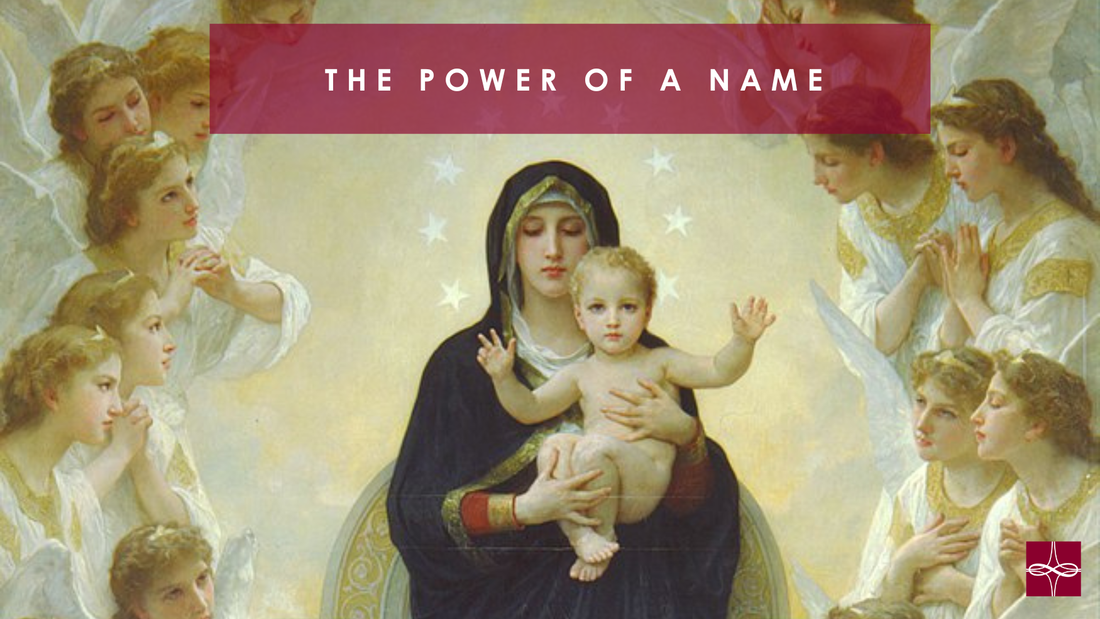

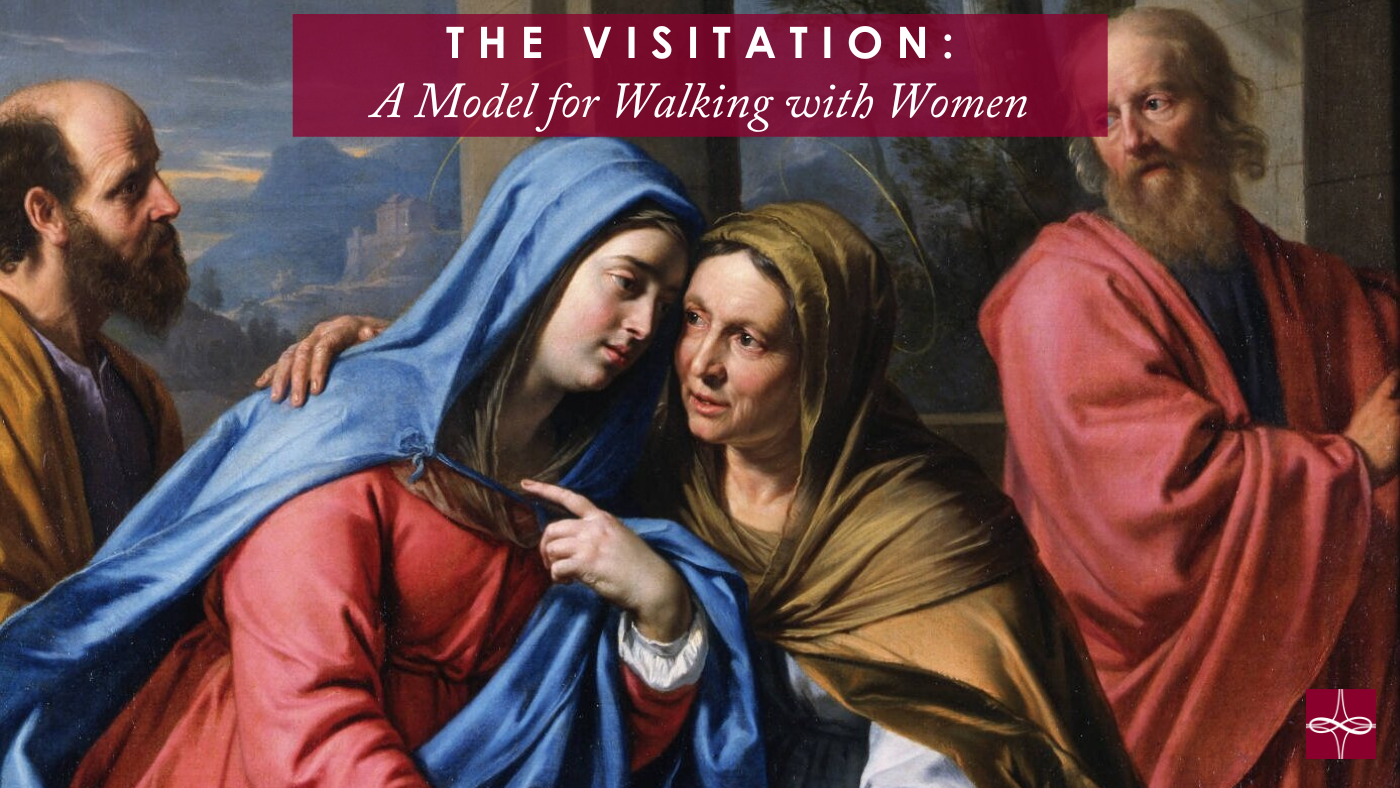

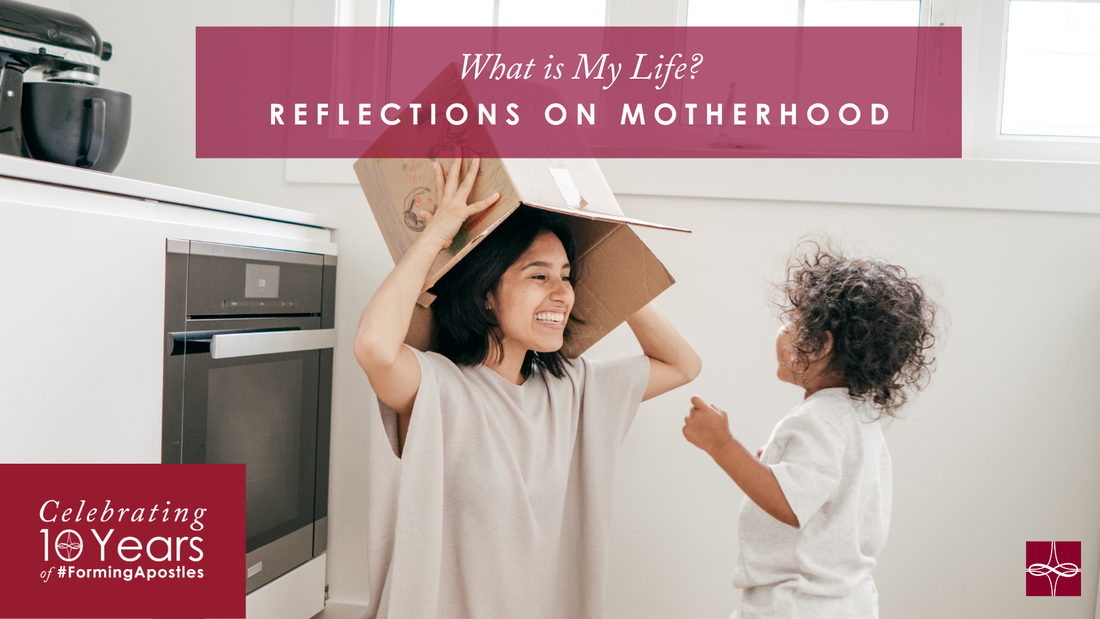

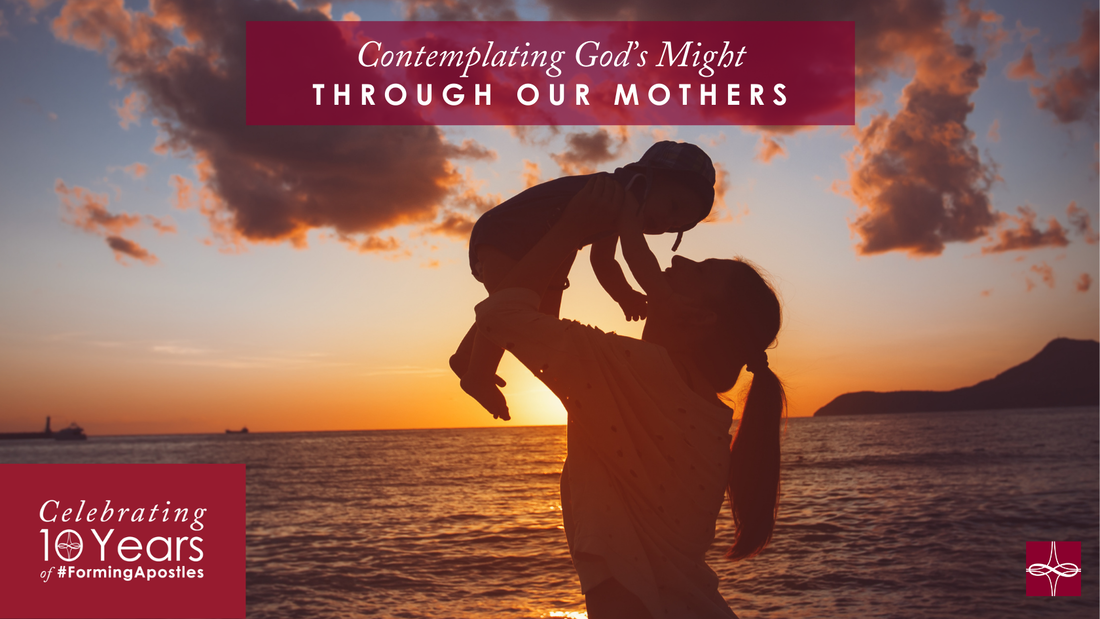
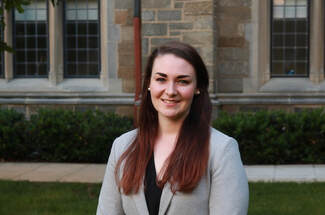
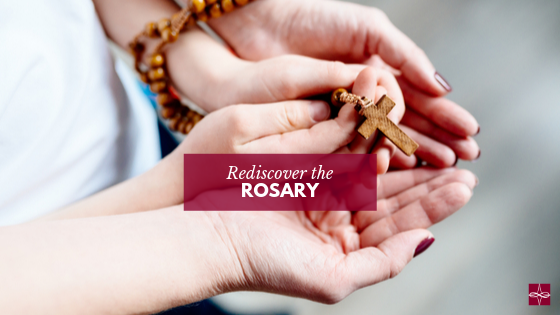



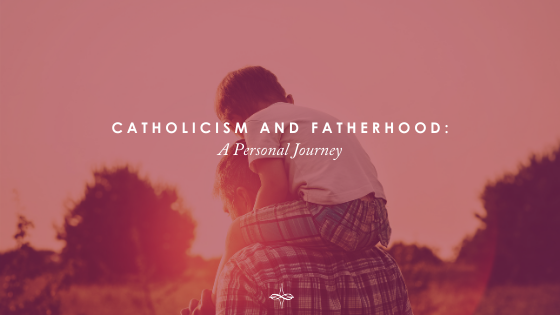

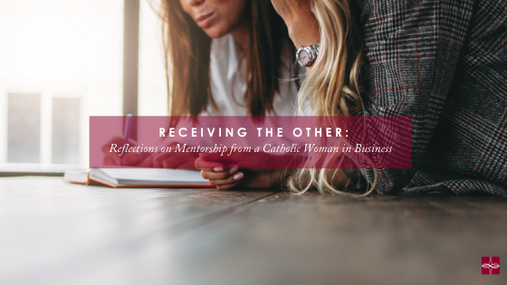

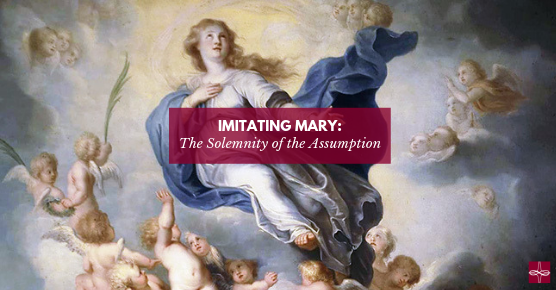

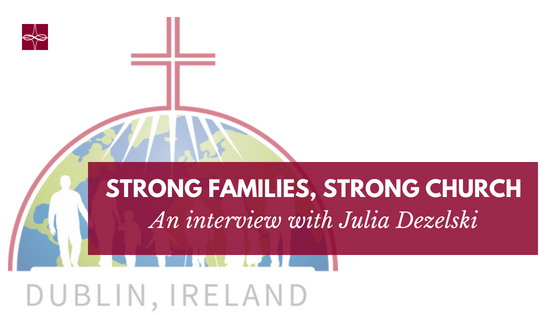
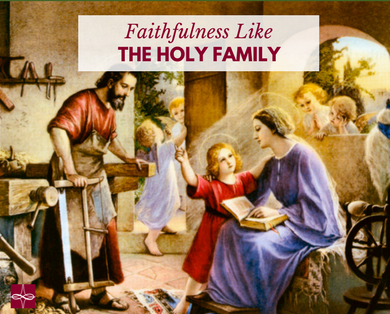
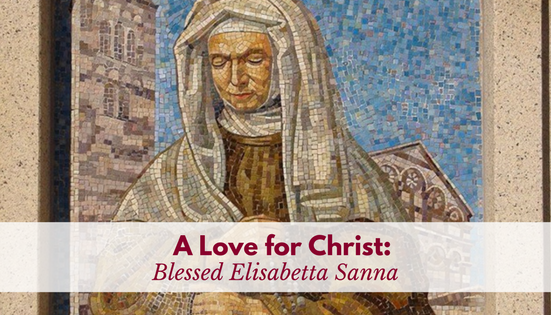

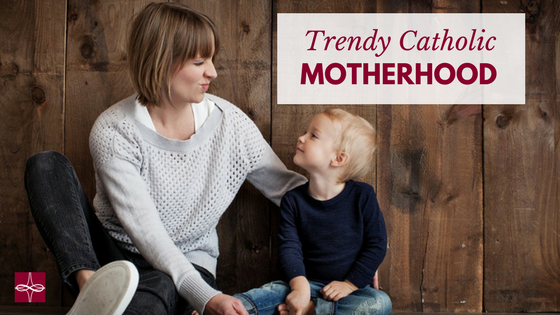

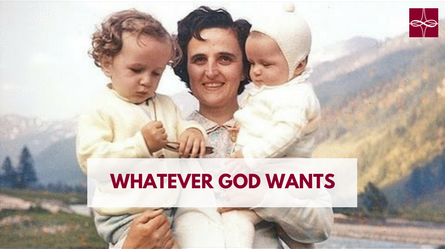
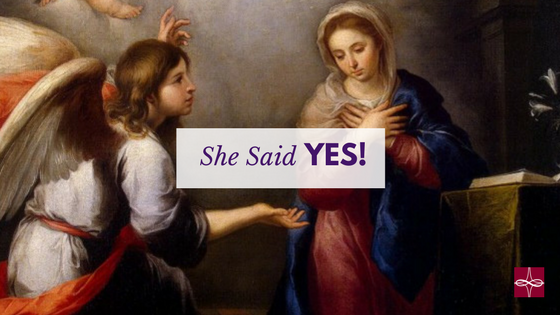

 RSS Feed
RSS Feed